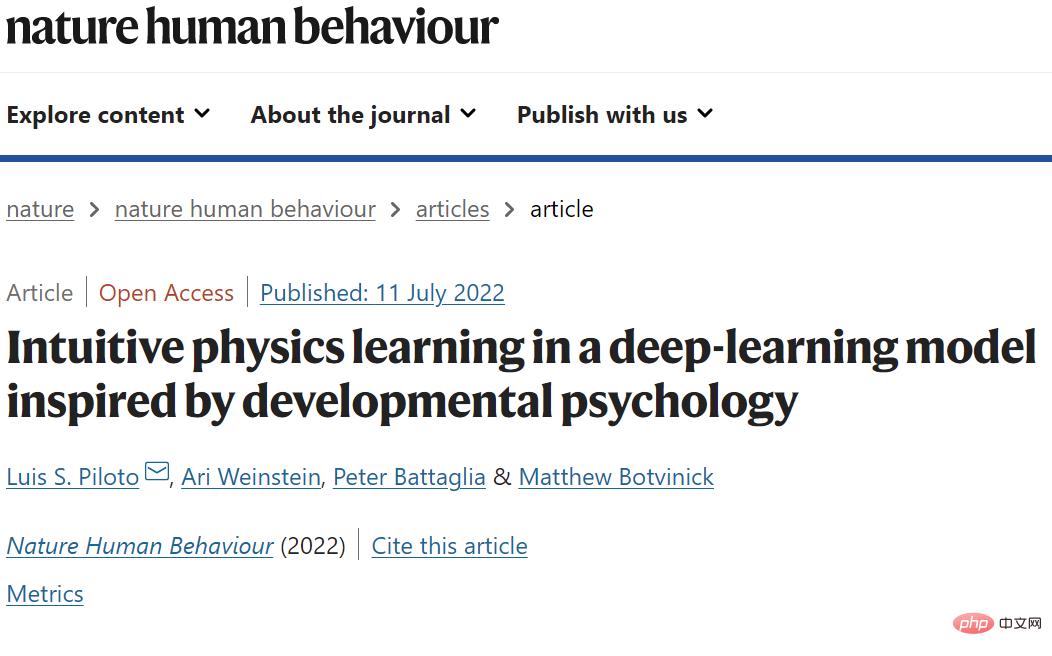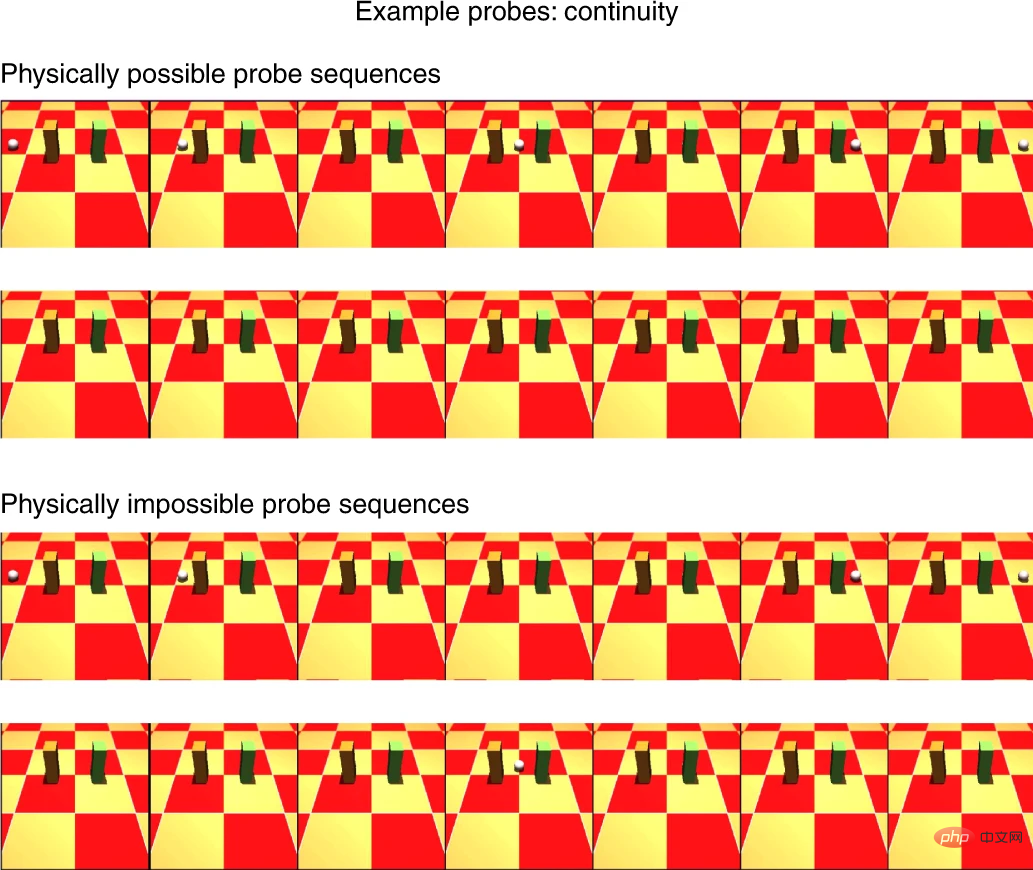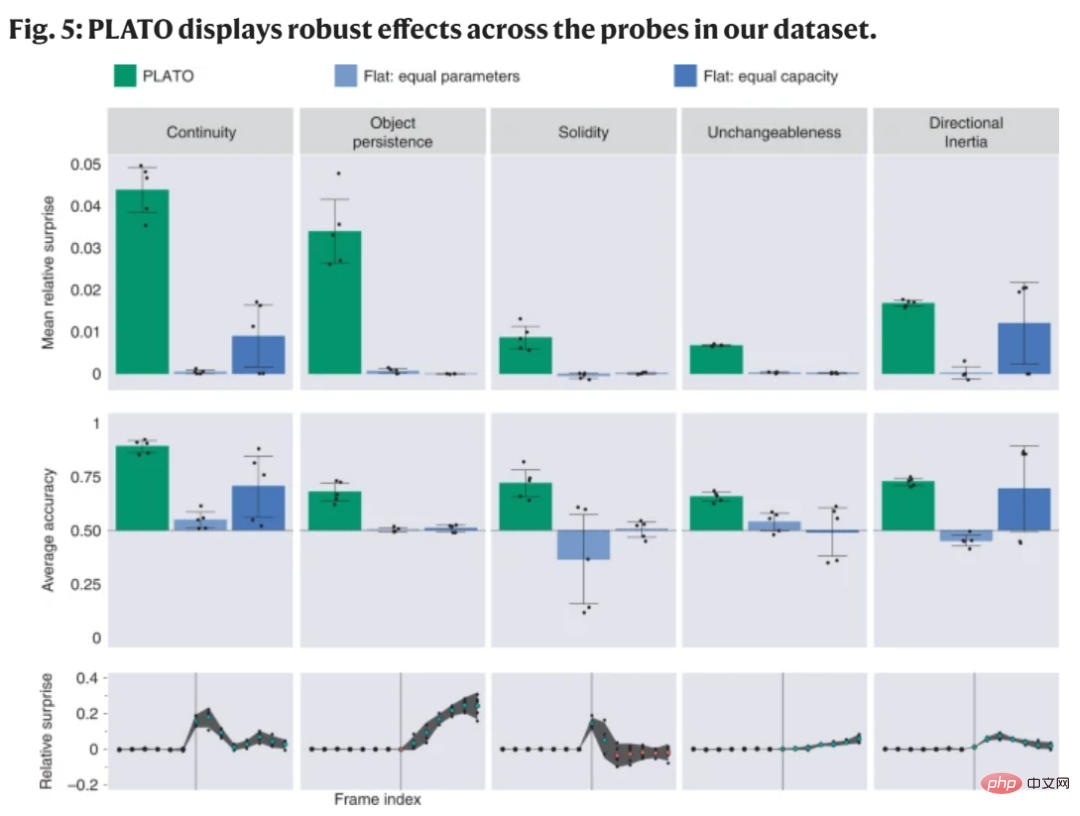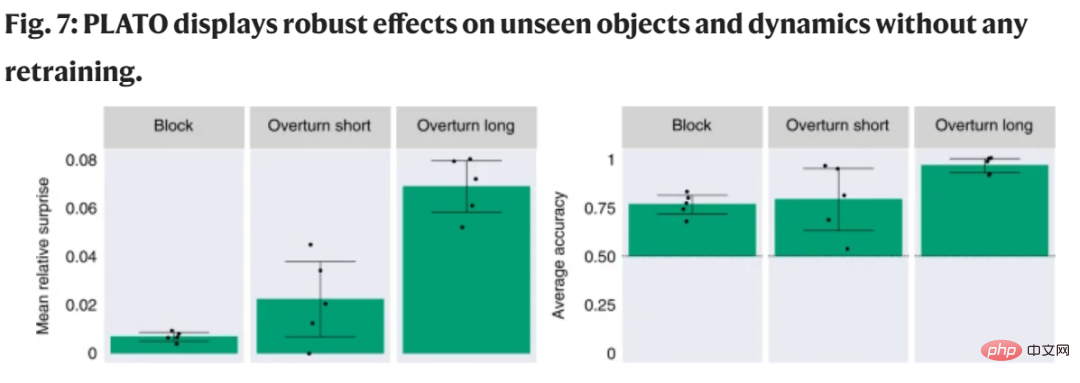 Technology peripherals
Technology peripherals
 AI
AI
 Learning like a baby, DeepMind's new model learns the rules of the physical world in 28 hours
Learning like a baby, DeepMind's new model learns the rules of the physical world in 28 hours
Learning like a baby, DeepMind's new model learns the rules of the physical world in 28 hours
Deepmind aims to build a model that can learn intuitive physics and analyze why the model achieves this ability.
From AlphaFold to mathematical reasoning, DeepMind has been trying to combine AI and basic science. Now, DeepMind has created a new model that can learn simple physical rules.
Developmental psychologists tested and analyzed how babies follow the movement of objects through their gaze. For example, children expressed surprise when a video was played in which a ball suddenly disappeared.
Computer scientist Luis Piloto of DeepMind and colleagues hope to develop similar tests for artificial intelligence (AI). The team trained a neural network using videos of animations of simple objects like cubes and balls, and the model learned by discovering patterns in large amounts of data. The research paper was published July 11 in Nature Human Behavior.

- Paper address: https://www.nature.com/articles/s41562-022-01394 -8
- Dataset address: https://github.com/deepmind/physical_concepts
This model performs physical learning by automatically encoding and tracking objects, Hence the name PLATO (Physics Learning through Auto-encoding and Tracking Objects). PLATO receives the original image from the video and a version of the image that highlights the targets of each object in the scene. PLATO aims to develop internal representations of the physical properties of objects, such as their position and velocity.
The system was trained on approximately 30 hours of videos showing simple motion mechanisms (such as a ball rolling down a slope) and developed the ability to predict how these objects would behave in different situations. . In particular, PLATO learns continuity and robustness to ensure that the trajectory of the target is uninterrupted and the shape of the object is persistent. As the video plays, the model's predictions become more accurate.
When playing videos with "impossible" events, such as an object suddenly disappearing, PLATO can measure the difference between the video and its own predictions, thus providing a measure of "surprise."
Piloto said: "PLATO was not designed as a model of infant behavior, but it can test hypotheses about how human infants learn. We hope that cognitive scientists will eventually use it to simulate infant behavior."
Jeff Clune, a computer scientist at the University of British Columbia, said, "Comparing AI with the learning methods of human infants is an important research direction. PLATO researchers hand-designed much of the prior knowledge that gives the artificial intelligence model advantages." Researchers like Clune are trying to let programs develop their own algorithms to understand the physical world.
Using knowledge from developmental psychology
In order to pursue richer physical intuition in AI systems, DeepMind’s research team draws inspiration from developmental psychology. The research team built a deep learning system that incorporates a core insight from developmental psychology, namely that physics is understood at the level of discrete objects and their interactions.
The core of intuitive physics relies on a discrete set of concepts (e.g., object persistence, solidity, continuity, etc.) that can be distinguished, manipulated, and individually detected. Traditional, standard approaches to AI learning intuitive physics learn about the physical world through video or state predictors, binary outcome predictions, question-answer performance, or reinforcement learning tasks. These approaches appear to require understanding some aspects of intuitive physics but do not explicitly operationalize or strategically explore a clear set of concepts.
Developmental psychology, on the other hand, holds that a physical concept corresponds to a set of expectations about how the future will unfold. For example, people expect that objects will not magically teleport from one place to another suddenly, but will trace a continuous path through time and space, which leads to the concept of continuity. Therefore, there is a way to measure knowledge of specific physical concepts: the Violation of Expectations (VoE) paradigm.
When exploring a specific concept using the VoE paradigm, researchers show infants visually similar arrays (called probes) that are either consistent (physically possible) or inconsistent (physically unlikely) with the physical concept. possible). In this paradigm, “surprise” is measured by gaze duration.

Method Introduction
First of all, DeepMind proposed a very rich video corpus-Physical Concepts data set. This dataset contains VoE probe videos targeting five important physical concepts considered core elements in developmental psychology, including continuity, goal persistence, and robustness. The fourth is immutability, which captures the concept that certain target properties (such as shape) do not change; the fifth concept is directional inertia, which involves the expectation that a moving object will change in a direction consistent with the principle of inertia.
The most important thing is that the Physical Concepts dataset also includes a separate video corpus as training data. These videos demonstrate various procedurally generated physics events.

Figure 2: Example of video dataset used to train the model
PLATO model architecture
Deepmind aims to build an intuitive learning model of physics, and analyze why the model achieves this capability. Some advanced systems in the field of AI are instantiated in the PLATO model.
The first is the target personalization process. The target personalization process cuts the visual continuous sensory input into a set of discrete entities, where each entity has a corresponding set of attributes. In PLATO, each segmented video frame is decomposed into a set of target codes (Fig. 3a-c) by the perceptual module, enabling mapping from visual input to individual targets. PLATO does not learn to segment the scene, but given a segmentation target, it learns a compressed representation.
Secondly, target tracking (or target index) assigns an index to each target, thereby achieving the correspondence between target perception and dynamic attribute calculation across time (Figure 3b, c) . In PLATO, target code is accumulated and tracked over frames in the target buffer (Figure 3d).
The last component is the relationship processing of these tracked targets. This process is inspired by the "physical reasoning system" proposed in developmental psychology, which can dynamically process the relationship between objects. Representations, generating new representations that are affected by relationships and interactions between objects and other objects.
PLATO learns the interaction between target memory and target perception history (Figure 3d) to generate predicted video frames for the next target and update target-based memory.

Figure 3: PLATO includes two components: perception module (left) and dynamic prediction (right)
Experimental results
In When tested, PLATO showed strong VoE effects in all five detection categories when trained with five different random seeds.

Figure 5: PLATO shows robust performance in probing the Physical Concepts dataset.
The training corpus in the Physical Concepts dataset contains a total of 300,000 videos. Using conservative calculations, that's approximately 52 days of continuous visual experience. From an AI and development perspective, there's the question of how much training data is actually needed to produce a VoE effect in testing. To evaluate this, Deepmind trained random seeds of three PLATO dynamic predictors on datasets of decreasing size (Figure 6), calculating a grand average of the VoE effects across all five detection classes.
Results show robust VoE effects in Deepmind’s models after training with as few as 50,000 examples (equivalent to 28 hours of visual experience) .

Figure 6: PLATO shows powerful results in just 28 hours of visual experience.
Generalization testing: Deepmind uses the ADEPT dataset, which is designed to explore intuitive physical knowledge. As shown in Figure 7, PLATO shows clear VoE effects for all three detection categories.

Figure 7: PLATO demonstrates robust effects on unseen targets and dynamics without any retraining.
For more information, please view the original paper.
The above is the detailed content of Learning like a baby, DeepMind's new model learns the rules of the physical world in 28 hours. For more information, please follow other related articles on the PHP Chinese website!

Hot AI Tools

Undresser.AI Undress
AI-powered app for creating realistic nude photos

AI Clothes Remover
Online AI tool for removing clothes from photos.

Undress AI Tool
Undress images for free

Clothoff.io
AI clothes remover

Video Face Swap
Swap faces in any video effortlessly with our completely free AI face swap tool!

Hot Article

Hot Tools

Notepad++7.3.1
Easy-to-use and free code editor

SublimeText3 Chinese version
Chinese version, very easy to use

Zend Studio 13.0.1
Powerful PHP integrated development environment

Dreamweaver CS6
Visual web development tools

SublimeText3 Mac version
God-level code editing software (SublimeText3)

Hot Topics
 Which of the top ten currency trading platforms in the world are the latest version of the top ten currency trading platforms
Apr 28, 2025 pm 08:09 PM
Which of the top ten currency trading platforms in the world are the latest version of the top ten currency trading platforms
Apr 28, 2025 pm 08:09 PM
The top ten cryptocurrency trading platforms in the world include Binance, OKX, Gate.io, Coinbase, Kraken, Huobi Global, Bitfinex, Bittrex, KuCoin and Poloniex, all of which provide a variety of trading methods and powerful security measures.
 Decryption Gate.io Strategy Upgrade: How to Redefine Crypto Asset Management in MeMebox 2.0?
Apr 28, 2025 pm 03:33 PM
Decryption Gate.io Strategy Upgrade: How to Redefine Crypto Asset Management in MeMebox 2.0?
Apr 28, 2025 pm 03:33 PM
MeMebox 2.0 redefines crypto asset management through innovative architecture and performance breakthroughs. 1) It solves three major pain points: asset silos, income decay and paradox of security and convenience. 2) Through intelligent asset hubs, dynamic risk management and return enhancement engines, cross-chain transfer speed, average yield rate and security incident response speed are improved. 3) Provide users with asset visualization, policy automation and governance integration, realizing user value reconstruction. 4) Through ecological collaboration and compliance innovation, the overall effectiveness of the platform has been enhanced. 5) In the future, smart contract insurance pools, forecast market integration and AI-driven asset allocation will be launched to continue to lead the development of the industry.
 Bitcoin price today
Apr 28, 2025 pm 07:39 PM
Bitcoin price today
Apr 28, 2025 pm 07:39 PM
Bitcoin’s price fluctuations today are affected by many factors such as macroeconomics, policies, and market sentiment. Investors need to pay attention to technical and fundamental analysis to make informed decisions.
 What are the top ten virtual currency trading apps? The latest digital currency exchange rankings
Apr 28, 2025 pm 08:03 PM
What are the top ten virtual currency trading apps? The latest digital currency exchange rankings
Apr 28, 2025 pm 08:03 PM
The top ten digital currency exchanges such as Binance, OKX, gate.io have improved their systems, efficient diversified transactions and strict security measures.
 How much is Bitcoin worth
Apr 28, 2025 pm 07:42 PM
How much is Bitcoin worth
Apr 28, 2025 pm 07:42 PM
Bitcoin’s price ranges from $20,000 to $30,000. 1. Bitcoin’s price has fluctuated dramatically since 2009, reaching nearly $20,000 in 2017 and nearly $60,000 in 2021. 2. Prices are affected by factors such as market demand, supply, and macroeconomic environment. 3. Get real-time prices through exchanges, mobile apps and websites. 4. Bitcoin price is highly volatile, driven by market sentiment and external factors. 5. It has a certain relationship with traditional financial markets and is affected by global stock markets, the strength of the US dollar, etc. 6. The long-term trend is bullish, but risks need to be assessed with caution.
 How to use the chrono library in C?
Apr 28, 2025 pm 10:18 PM
How to use the chrono library in C?
Apr 28, 2025 pm 10:18 PM
Using the chrono library in C can allow you to control time and time intervals more accurately. Let's explore the charm of this library. C's chrono library is part of the standard library, which provides a modern way to deal with time and time intervals. For programmers who have suffered from time.h and ctime, chrono is undoubtedly a boon. It not only improves the readability and maintainability of the code, but also provides higher accuracy and flexibility. Let's start with the basics. The chrono library mainly includes the following key components: std::chrono::system_clock: represents the system clock, used to obtain the current time. std::chron
 Recommended reliable digital currency trading platforms. Top 10 digital currency exchanges in the world. 2025
Apr 28, 2025 pm 04:30 PM
Recommended reliable digital currency trading platforms. Top 10 digital currency exchanges in the world. 2025
Apr 28, 2025 pm 04:30 PM
Recommended reliable digital currency trading platforms: 1. OKX, 2. Binance, 3. Coinbase, 4. Kraken, 5. Huobi, 6. KuCoin, 7. Bitfinex, 8. Gemini, 9. Bitstamp, 10. Poloniex, these platforms are known for their security, user experience and diverse functions, suitable for users at different levels of digital currency transactions
 Which of the top ten currency trading platforms in the world are among the top ten currency trading platforms in 2025
Apr 28, 2025 pm 08:12 PM
Which of the top ten currency trading platforms in the world are among the top ten currency trading platforms in 2025
Apr 28, 2025 pm 08:12 PM
The top ten cryptocurrency exchanges in the world in 2025 include Binance, OKX, Gate.io, Coinbase, Kraken, Huobi, Bitfinex, KuCoin, Bittrex and Poloniex, all of which are known for their high trading volume and security.





